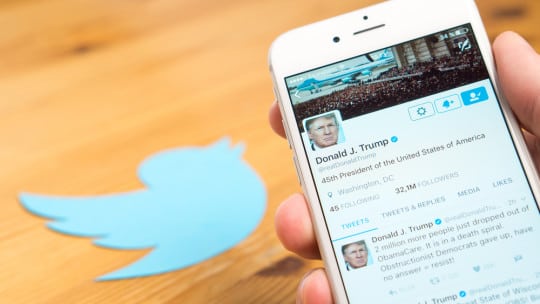
A difficult week for Twitter continued with an 11-minute shutdown of President Trump's Twitter account on the evening of Nov. 2.
Minutes after users started calling out Trump's downed account in a range of accusatory and jocular tweets, the company restored Trump's feed and responded from its Government account:
Earlier today @realdonaldtrump’s account was inadvertently deactivated due to human error by a Twitter employee. The account was down for 11 minutes, and has since been restored. We are continuing to investigate and are taking steps to prevent this from happening again.
— Twitter Government (@TwitterGov) November 3, 2017
Two hours later, Twitter revealed that the account was taken down by a departing customer support employee:
Through our investigation we have learned that this was done by a Twitter customer support employee who did this on the employee’s last day. We are conducting a full internal review. https://t.co/mlarOgiaRF
— Twitter Government (@TwitterGov) November 3, 2017
What steps Twitter plans to take to prevent another hijacking of the most influential Twitter account in the U.S. remain to be seen. (Twitter's communications team was unavailable for comment.) The brief account shutdown raises many questions and concerns about social platforms' power over public and political sentiment. Who will be silenced? Who will be given the loudest voice? And who will make those decisions—the tech companies, the public or the federal government?
Unfortunately for Twitter, the list of questions doesn't end there. The social giant has been on the Capitol Hill hot seat this week, with its general counsel Sean Edgett facing questions about Russian election meddling, along with lawyers from Facebook and Google.
At least a small slice of troll pie has been cut out of the equation. On the second day of the congressional hearings, Twitter released a list of 2,752 now-deactivated accounts linked to the Russian-based influencer operations company Internet Research Agency, which Facebook's general counsel Colin Stretch said had been attacking election discourse as early as 2015 according to a WIRED report.
And while Twitter has also made some changes to its transparency guidelines to allow its users to see spending and targeting data from political advertisers, it appears federal scrutiny will only intensify. As Sen. Dianne Feinstein (D-CA) put it on the second day of congressional hearings, "You’ve created these platforms, and now, they’re being misused, and you have to be the ones to do something about it. Or we will."
Follow Sophie: @SophieMaerowitz
